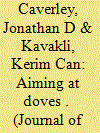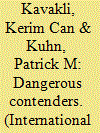| Srl | Item |
| 1 |
ID:
154742


|
|
|
|
|
| Summary/Abstract |
Politicians (and journalists covering them) assume that association with the military has political consequences. We propose and experimentally test conditions under which military images have such effects. We presented subjects with images of the US president before varying backgrounds—including soldiers, students, children, and “ordinary” people. Only the image of soldiers has any significant effect, shifting participant preferences toward spending money on defense over education. The image does this by increasing respondent sense of threats to national security, despite the military’s depiction out of combat and in the background. The soldiers image does little to shift opinion about the president. However, the image has the largest hawkish effect on both the president’s copartisans and the strongest supporters. Given the routine use by many democracies of tactics unlikely to produce images of one’s fellow citizens in combat, the power of more sanitized images to cue hawkish policy preferences requires increased attention.
|
|
|
|
|
|
|
|
|
|
|
|
|
|
|
|
| 2 |
ID:
171169


|
|
|
|
|
| Summary/Abstract |
How do international observers decide whether to criticize or condone electoral fraud in a country? We argue that this decision depends on the identity of the victims of electoral fraud. A monitoring organization is more likely to overlook fraud committed against groups that are deemed dangerous by its sponsor. Based on this insight, we hypothesize that in the post-Cold War era election monitors are more tolerant of fraud against Islamic challengers, especially when Islamic movements are perceived as a threat to political stability. In support of our hypothesis, we find that outside monitors are more likely to endorse an election in countries with an Islamic opposition party and an ongoing Islamist terrorist campaign. Furthermore, we find that the effect is driven by Western monitoring organizations and becomes stronger after the September 11 attacks. Our findings provide a simple yet powerful insight: the calculus of outside observers depends not only on who they wish to see in power, but also who they want to keep from power.
|
|
|
|
|
|
|
|
|
|
|
|
|
|
|
|